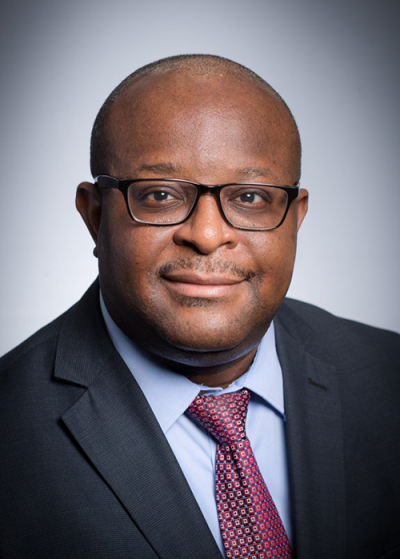
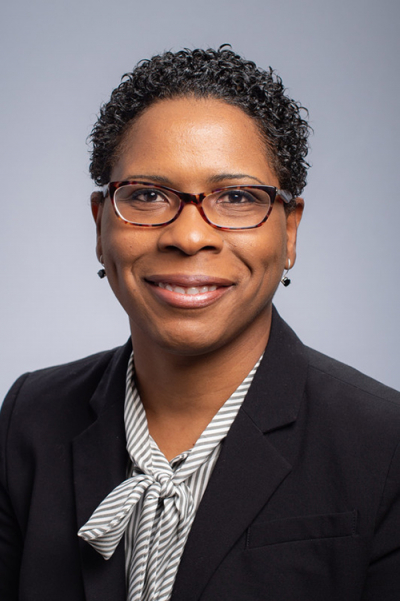
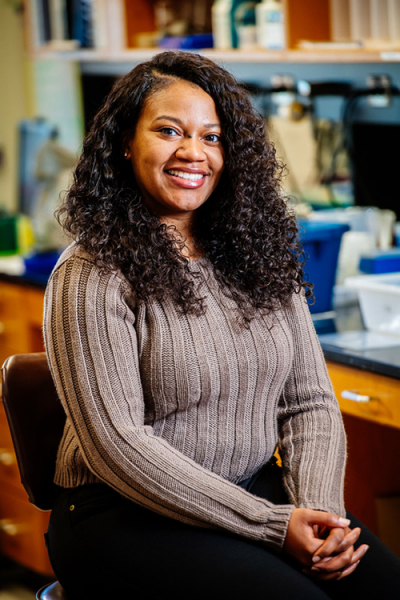
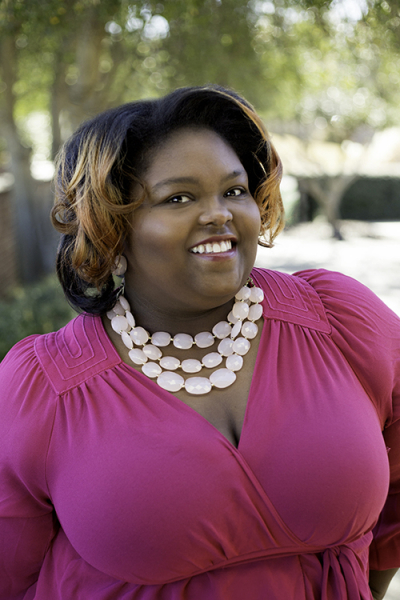
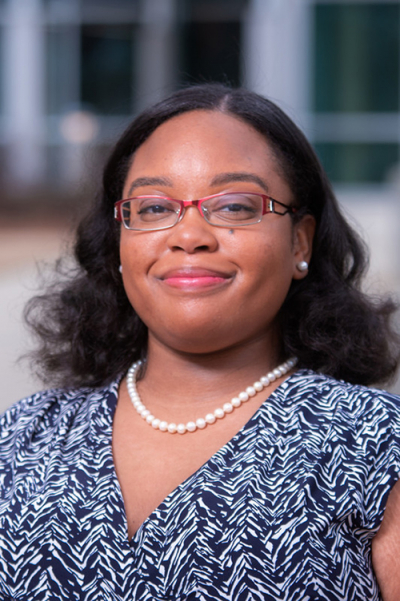
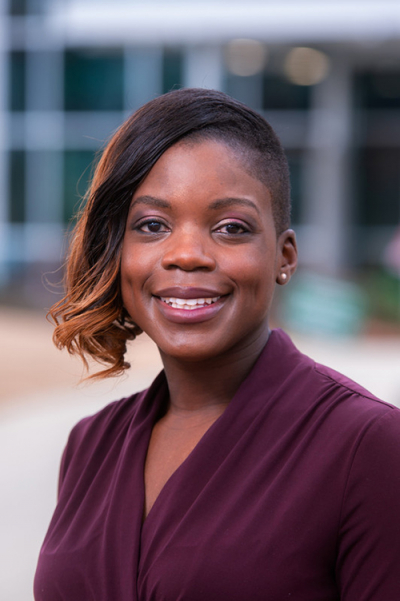
Photography: Steve Wood and Lexi Coon
Eight University of Alabama at Birmingham researchers were named to a list of “1,000 Inspiring Black Scientists,” published in Cell Mentor this winter.
The list was gathered by The Community of Scholars — scientists and educators who aspire to bolster and increase diversity across all scientific fields, promote retention through the “leaky academic pipeline,” and broaden academic and industrial awareness of diversity and inclusion. The Community of Scholars is a network of people often excluded because of their ethnicity or race, and it is composed of postdoctoral fellows, early-stage investigators, instructors and consultants.
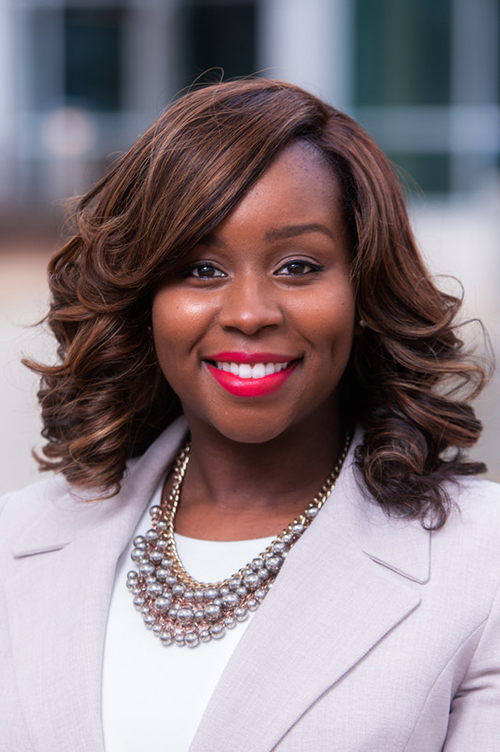 Kristen Allen Watts, Ph.D.The UAB researchers in the Inspiring Black Scientists list include:
Kristen Allen Watts, Ph.D.The UAB researchers in the Inspiring Black Scientists list include:
- Farah D. Lubin, Ph.D.
Lubin is an associate professor in the Department of Neurobiology, UAB School of Medicine. She directs the National Institute of Neurological Disorders and Stroke’s Neuroscience Roadmap Scholar Program at UAB, co-directs the postdoctoral IRACDA-MERIT Program at UAB, serves as faculty advisor for the UAB Black Postdoctoral Association, and co-chairs the UAB School of Medicine Black/African-American Faculty Association. Lubin is an epigenetics researcher, and heads the Neuro-Epigenetics and Memory Laboratory at UAB. Her research team focuses on the study of molecular genetic mechanisms that govern how gene expression programs control memory formation in the healthy brain. Her research will help us to better understand how these epigenetic mechanisms are disturbed in neurological disorders like Alzheimer’s disease and epilepsy and provide potential treatment options to improve memory dysfunction associated with these disorders. - Akinyemi I. Ojesina, M.D., Ph.D.
Ojesina is an assistant professor in the Department of Epidemiology, UAB School of Public Health, an associate scientist at the O’Neal Comprehensive Cancer Center at UAB, and an adjunct faculty investigator at the HudsonAlpha Institute for Biotechnology. Ojesina leads a team investigating tumors as an ecosystem, in which viral, bacterial and other microbes synergize with genomic alterations in cancer. They use that paradigm to ask questions about how cancer starts and why cancers recur after treatment, in order to foster improvements in cancer prevention, diagnosis and therapy. - Foluso “Joy” Ogunsile, M.D.
Ogunsile is an assistant professor in the UAB Department of Medicine, Division of Hematology and Oncology. She has a clinical focus in non-malignant hematology, but focuses primarily on the care of sickle cell disease. Her research seeks to improve clinical outcomes and survival for adults with sickle cell disease by increasing physical activity. Her research will help us understand exercise physiology in sickle cell disease. - Kristen Allen Watts, Ph.D.
Allen Watts is a postdoctoral fellow in the Department of Psychology Behavioral Pain Research Laboratory, in the UAB College of Arts and Sciences. Allen Watts holds an Institutional Research and Academic Career Development Award/Mentored Experiences in Research, Instruction and Teaching fellowship — or IRACDA/MERIT fellowship — from the National Institutes of Health. Her research interest is managing chronic, overlapping medical conditions among underserved groups, with a focus on developing and pilot-testing a self-management intervention for chronic pain and Type 2 diabetes in African Americans from the Deep South. - Michelle Gray, Ph.D.
Gray is an associate professor in the UAB Department of Neurology, and a Dixon Scholar in Neuroscience in the Center for Neurodegeneration and Experimental Therapeutics. She is the co-director of the School of Medicine’s Summer in Biomedical Sciences Program, or SIBS, for undergraduate students. She also co-directs the Glial Biology and Pathology Pillar in the Comprehensive Neuroscience Center. Gray is a member of the national Scientific Advisory Boards for the Huntington’s Disease Society of America and the Hereditary Disease Foundation. Her research is focused on understanding the mechanisms underlying Huntington’s disease, with a focus on the contribution of astrocyte glial cells in the pathogenesis of this disease. - Ninecia Scott, Ph.D.
Scott is a postdoctoral fellow in the UAB Department of Microbiology. Scott is an IRACDA/MERIT at-large fellow and an Immunologic Disease and Basic Immunology trainee. Her research focuses on the molecular basis of cardiac damage during invasive pneumococcal disease.
“It is truly an honor to work alongside such inspiring and hardworking Black scientists,” said Selwyn Vickers, M.D., senior vice president and dean of the UAB School of Medicine. “Their work is continuously pushing the boundaries of what we know about science and creating breakthroughs that can help patients around our community, and the globe.”
 Farah D. Lubin, Ph.D.Three of the UAB Inspiring Scientists are now at other institutions.
Farah D. Lubin, Ph.D.Three of the UAB Inspiring Scientists are now at other institutions.
- Maigen Bethea, Ph.D.
Bethea earned her doctoral degree at UAB, working in the lab of Chad Hunter, Ph.D., associate professor in the Department of Medicine, Division of Endocrinology, Diabetes and Metabolism. Bethea is now at the University of Colorado Anschutz Medical campus as a postdoctoral fellow with Darleen Sandoval, Ph.D., Department of Pediatrics. Bethea’s work focuses on adaptations of the gut-brain axis after bariatric surgery and how this leads to weight loss and glucose homeostasis. - Pamela N. Brady, Ph.D.
Brady was a postdoctoral research fellow in the Department of Chemistry, UAB College of Arts and Sciences, with former assistant professor Margaret Johnson, Ph.D. At UAB, Brady also held an IRACDA/MERIT fellowship. She is now at Talladega College, Talladega, Alabama, as assistant professor and chair of the Department of Chemistry. - Hadiyah-Nicole Green, Ph.D.
Green earned her Ph.D. in physics, working in the lab of Sergey Mirov, Ph.D., a University Professor in the Department of Physics, UAB College of Arts and Sciences. She is now assistant professor in the Department of Surgery, Morehouse School of Medicine. Green is a multidisciplinary physicist who specializes in nanobiophotonics and targeted cancer therapeutics, using lasers, nanoparticles and antibodies to develop biomarker-specific platforms to target, image and treat malignant tumors including head and neck and women’s cancers.
“The College of Arts and Sciences is happy to celebrate this recognition of Dr. Kristen Allen Watts, as well as former postdoctoral research fellow Dr. Pamela N. Brady and alumna Dr. Hadiyah-Nicole Green,” said Kecia M. Thomas, Ph.D., dean of the UAB College of Arts and Sciences. “Likewise, we use this acknowledgment of their work to also recognize the persistence and excellence of all of the hidden figures of the past who forged the path for a more diverse and inclusive academy.”
The online publication Cell Mentor was launched in 2019, in cooperation with Cell Signaling Technology, as a new educational resource to help biology students and researchers navigate their careers, get published and strengthen their laboratory skills. Cell Mentor has posts, videos, tutorials, handbooks and articles that address four key pillars in a researcher’s scientific journey: Get Inspired, Get Technical, Get Published and Get Hired.
The departments of Neurobiology, Medicine, Neurology and Microbiology are all in the UAB School of Medicine. At UAB, Vickers holds the James C. Lee, Jr., Endowed Chair for the Dean of the School of Medicine.